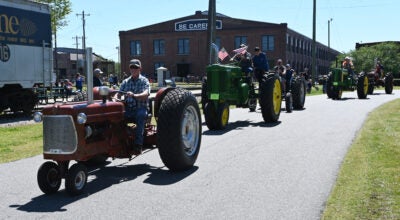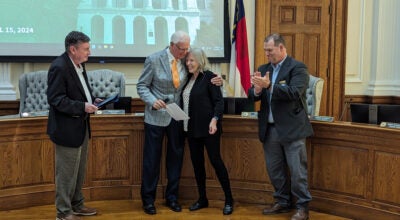Published 12:00 am Saturday, June 15, 2013
SALISBURY — By the time you read this, historian Joseph McGill, Historic Salisbury Foundation Executive Director Brian Davis and their companions will have done something few others can claim.
They will have slept in a cabin where African American slaves lived — a tiny, red-painted building with wood shingles that many locals know as “the Hall House kitchen.”
Friday night, McGill, Davis and others bedded down inside the restored cabin adjacent to the Dr. Josephus Hall House.
It was the 44th such cabin McGill has visited in the years since he began the Slave Dwelling Project — an effort to visit the places where slaves lived, to sleep there and to have the owners of those properties spend the night there as well.
Earlier Friday evening, McGill gave a talk on the Slave Dwelling Project to more than 50 local residents who gathered on the Hall House lawn.
Young and old, black and white, they heard McGill’s stories not only of the places he’s visited, but of the history behind them.
Before the talk, McGill said he undertook the project to fill “a void in American history, that void being a lack of attention to African American history.”
He said that today’s history books focus more on the lives and struggles of slaves, but that historians tend to focus more on slavery as a source of labor, only.
“They make it seem like we were brought over for our strength, but it was more than that,” McGill said. “We made things. We made bricks. We had the skills to shape those bricks into houses. We had the knowledge of how to grow rice.”
He said the Slave Dwelling Project was a chance to shed light on that fact. He writes about his experiences on his blog, as well as on Facebook.
Talking about the project with the audience, there are three things he said he does not do.
McGill said he’s not a relic hunter, nor is he interested in “ghost hunts” or the supernatural.
And, he said, he’s distanced himself from those who seek reparations for slavery.
Instead, McGill said, he’s trying to show he has “the courage to interpret these buildings for what they really are.”
McGill, who works with the National Trust for Historic Preservation and developed the Slave Dwellings Project on his own as a hobby, has stayed at former slaves’ homes in 13 states.
He said his concept was to “find the stewards of these places” — historic homes and plantations like the Hall House — “and I ask the owners to spend the night.”
McGill said he has had to deal with skepticism.
In one case, McGill said, he was denied permission to stay in slave quarters on a plantation where William Faulkner had stayed, for fear the visit would cause controversy and distract from their tourist trade.
Instead of being controversial, McGill said his visits have helped bridge the racial divide and start conversations among both descendants of former slaves and the descendants of former slave owners.
Joining him at Friday’s talk, and at the Hall House slave cabin overnight, was Prinny Anderson.
Anderson introduced herself as “the four-times-great granddaughter of a slave owner, and the five-times-great niece of the enslaved woman with whom he had a second family.”
Anderson then went on to give her four-times-great grandfather’s name: Thomas Jefferson.
With both Jefferson and the slave Sally Hemings in her family tree, Anderson said she had been privileged to spend the night with McGill and others in former slave quarters, talking to “descendants of women whose great-grandparents had been slaves on that property.”
“They told stories about all their ancestors,” she said. “I felt so blessed by that experience, and by the depth of generations we were touching.”
After the talk, guests toured the small cabin, which has been restored and furnished to match the period when slaves would have lived there.
“I find it amazing that the building is still standing,” said Cynthia Sloan, of Salisbury.
Sloan said that she plans to share her pictures of the cabin with the students she’ll be teaching at North Rowan Middle School, where she’s a language arts instructor.
“We have a rich history in Salisbury, as an African American community,” Sloan said.
Thirteen-year-old Niaja Wilson toured the cabin with her mother, Deanna Dunlap, her grandmother, Martha Dunlap, and her brother, Jasiyah, 10.
“It’s amazing,” Wilson said. “They slept in one little room, (and) a very small attic. They cooked all their meals there.”
“There’s so little room. There wouldn’t be enough room for us, and there’s only three of us,” Wilson said.
Her grandmother said that, despite having lived in Salisbury all her life, she never knew about the slave quarters still standing behind the Hall House.
“It was something I think everybody who could have come, should have come to experience,” Martha Dunlap said.
For McGill, that’s part of the purpose of the Slave Dwelling Project.
He spoke of Coming to the Table, an organization designed to help bring people of different races together for communication and understanding. The group has publicized the Slave Dwelling Project.
Preserving history and understanding it, McGill said, can help heal wounds and divisions.
That was also the takeaway for Kerry Campion, 11.
Her mother, Leah, is a member of the Historic Salisbury Foundation board.
Though they live nearby, Leah said the family had seen the finished interior of the cabin for the first time Friday.
Besides her mother, Kerry toured with sister Abby, grandfather Thomas Campion and cousin Mady.
Kerry also said she was surprised by the cramped conditions inside the slave quarters.
At the same time, she said she was glad that the building had not been torn down, but could be used for education.
“It’s how we preserve our history,” Kerry said. “It’s good for kids to see this, too.”
Contact Hugh Fisher via the editor’s desk at 704-797-4244.




